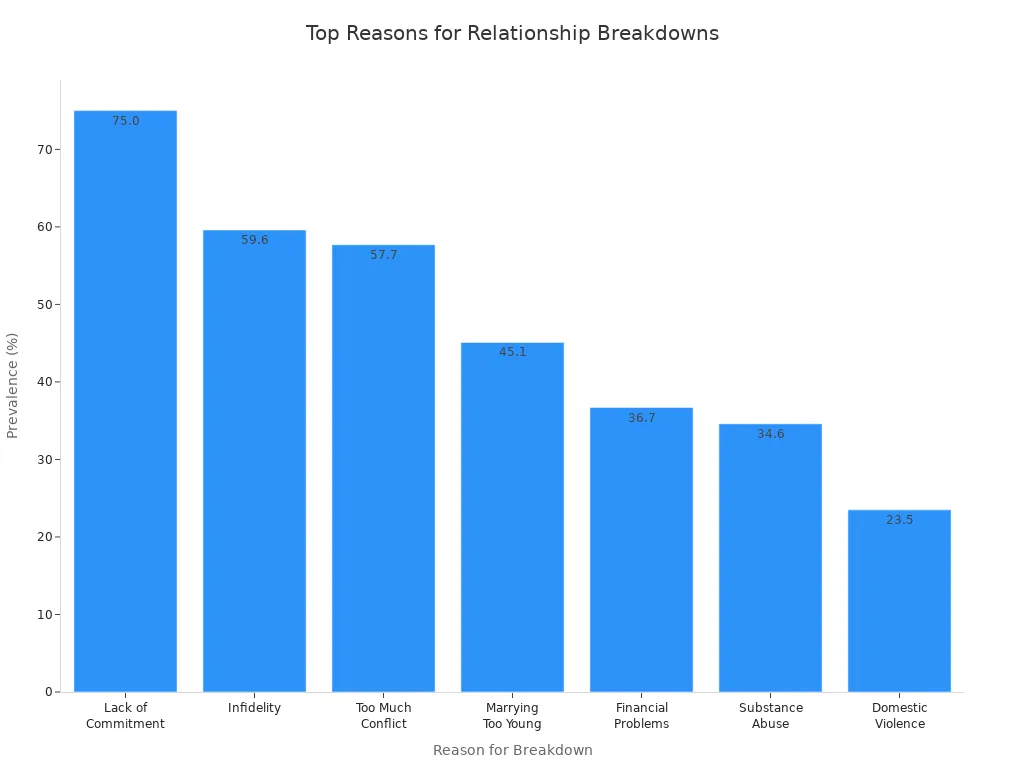How to Fix a Broken Relationship and Rebuild Trust

You might feel hurt, confused, or even hopeless right now. That’s normal when trust breaks. The good news? Many couples do find a way back. In fact, recent studies show that over 75% of couples who try emotion-focused therapy report real improvement. You and your partner can fix relationship problems if you both commit, reflect, and stay patient. There are proven ways to fix a broken relationship when both people are willing to try. Healing takes time, but it’s possible.
Key Takeaways
Notice signs of a broken relationship like feeling far apart, blaming each other, or not being yourself. This helps you start to heal. - Admit what you did wrong and say sorry in a real way. This helps bring back trust and closeness. - Listen well and try to understand how your partner feels. This makes your partner feel safe. - Build trust by being honest, doing what you say, and making sure both people feel safe over time. - Ask for help if you need it, take care of yourself, and know when it is best to let go and move forward.
Recognize the Problems
Signs of a Broken Relationship
Sometimes, things just do not feel right with your partner. You might skip talking about big things. You may feel lonely even when you are together. Here are some signs experts say show a relationship is broken:
You do not help each other or ignore feelings.
You talk in a mean way or blame each other a lot.
You feel like you must hide your real self.
You feel far apart, lonely, or worried.
You feel tired, stressed, or cannot sleep well.
Understand What Went Wrong
It is good to think about what caused the problems. Studies say most relationships end for more than one reason. Common causes include lack of commitment, infidelity, too much conflict, marrying too young, financial problems, substance abuse, and domestic violence.

You might see your own problems in this list. Things like bad talking, trust issues, or money worries often happen together.
Self-Reflection
Take time to think about your own actions and feelings. Self-reflection means asking yourself honest questions. Did you avoid hard talks, stay mad, or forget your partner's emotional needs? When you think about your part, you start to care more about both of you.
Try writing in a journal or talking to a friend you trust. These things help you see patterns and know your feelings. If you try to understand your partner’s side, you can start to make things better. Couples who do self-reflection often find it easier to fix problems and trust again.
Steps to Fix Relationship
When you want to fix relationship problems, you need a clear plan. Experts say that repairing a broken bond works best when you follow certain steps. You can think of it like building a bridge together, one careful step at a time.
Take Responsibility
You might feel tempted to blame your partner or make excuses. That only creates more distance. Instead, take responsibility for your actions and words. When you admit your mistakes, you show maturity and a real desire to grow. This is especially important if you need to fix a relationship you ruined through your actions.
Say what you did wrong without defending yourself.
Listen to your partner’s feelings, even if it feels hard.
Avoid blaming or shaming. Focus on your own choices.
You do not have to feel shame. Guilt can help you learn, but shame keeps you stuck. When you own your part and shift your mindset, you open the door to healing.
Apologize and Forgive
A real apology can change everything. It is not just about saying “I’m sorry.” You need to show that you understand the hurt and want to make things right. Studies show that sincere apologies—especially ones that match the type of hurt—help rebuild trust.
When you apologize, you signal that you want to fix relationship wounds and move forward. Forgiveness is just as important. It does not mean forgetting or excusing what happened. It means letting go of grudges so you both can heal and have a fresh start.
Show Empathy
Empathy means you try to feel what your partner feels. You listen, care, and try to see things from their side. This is one of the most powerful tools to fix relationship problems.
Ask your partner how they feel and really listen.
Repeat back what you hear to show you understand.
Avoid jumping in with advice or judgment.
Research shows that empathy helps people move from anger or emotional pain to forgiveness. When you show empathy, you build trust and make it easier for both of you to reconnect. You also create a safe space where both of you can share openly and improve relationship dynamics.
A Structured Repair Process
Here are simple strategies you can follow:
Commit to working together. Both of you need to agree to fix relationship issues.
Stop any hurtful actions. No more blaming, yelling, or ignoring.
Take responsibility for your part.
Apologize sincerely and offer to make things right.
Show empathy and listen to your partner’s feelings.
Set shared goals for the future. Plan fun activities or projects together.
If things feel stuck, consider couples therapy for extra support.
Rebuild Trust

Trust is the heart of every strong relationship. When trust breaks, you might feel lost or unsure if things can ever feel safe again. The good news? You can rebuild trust with honesty, care, and steady effort. Let’s look at how you can do this together.
Be Transparent
Transparency means you let your partner see the real you. You share your thoughts, feelings, and even your worries. When you are open, you show that you have nothing to hide. This helps your partner feel safe and valued.
Here are some ways to practice transparency:
Share your feelings, even if they are hard to say.
Answer your partner’s questions honestly.
Let your partner know about your plans and activities.
Talk about your mistakes and what you are doing to fix them.
Set regular times to check in with each other.
Tip: Transparency is not about giving up your privacy or letting your partner control you. It is about building trust by being open and honest.
Relationship experts say that transparency also means listening without judgment. When you listen, you show respect and care. You can also share access to things like social media or email if it helps your partner feel secure, but only if both of you agree. Remember, transparency works best when you both feel safe and respected.
Consistent Actions
Words matter, but actions matter more. You rebuild trust by showing, not just telling, that you can be counted on. If you broke trust before, your partner needs to see real change over time.
Research shows that trust grows when you:
Keep your promises, even the small ones.
Show up when you say you will.
Follow through on your commitments.
Make positive changes and stick with them.
Stay patient, even if progress feels slow.
Consistent actions plant seeds of hope. Over time, your partner will start to believe in you again.
You cannot fix relationship problems overnight. Trust comes back when your partner sees you doing the right thing again and again. With patience and commitment, you can rebuild stronger than before. This steady effort helps break down walls and brings you closer.
Create Emotional Safety
Emotional safety means you both feel safe to share, even when things get tough. You know your partner will listen and not judge you. This is key for rebuilding trust.
Try these steps to create emotional safety:
Listen with your full attention. Put away your phone and look at your partner.
Show that you care by nodding, smiling, or holding hands.
Respect your partner’s boundaries. If they need space, give it.
Speak kindly, even when you disagree.
Take responsibility for your actions and say sorry when needed.
Give your partner the benefit of the doubt. Try to understand their side.
Important Resource: Creating emotional safety requires recognizing when interactions might involve manipulation or make you question your own perceptions. Gaslighting Check can help you identify manipulation patterns that undermine emotional safety. This tool is especially valuable when rebuilding trust, as it helps ensure your communication remains healthy and respectful.
Therapists say that emotional safety grows when you both practice honesty, patience, and kindness. You do not have to share everything at once. Start small and build trust step by step.
Letting Go of Grudges
Holding onto old hurts keeps you stuck. Forgiveness does not mean you forget what happened. It means you choose to move forward. When you let go of grudges, you make space for healing and new memories. Sometimes this feels like you start your relationship over with a clean foundation.
You can fix relationship wounds by talking openly, checking in often, and showing that you care. Trust takes time, but with steady effort, you can build something even stronger than before.
Improve Communication

Good communication helps you fix relationship problems and feel close again. When you talk and listen well, you both feel heard and respected. Let’s look at some simple ways to make your conversations better.
Active Listening
Active listening means you give your full attention to your partner. You do not just hear words—you try to understand feelings, too. Studies show that active listening helps couples solve problems and feel more stable together. It also makes arguments less stressful.
Here’s how you can practice active listening:
Look at your partner when they talk.
Nod or say “I see” to show you are listening.
Repeat back what you heard in your own words.
Ask open questions like, “How did that make you feel?”
Tip: Take turns sharing. Let your partner finish before you speak. This helps both of you feel valued.
These skills can feel strange at first, but they get easier with practice. You will notice fewer fights and more understanding.
Use “I” Statements
When you talk about problems, use “I” statements instead of blaming. For example, say, “I feel upset when we do not talk,” instead of, “You never listen to me.” Experts say “I” statements help you share your feelings without making your partner defensive. This makes it easier to fix relationship issues.
Using “I” statements helps your partner understand your feelings. It also keeps the conversation calm and respectful.
Reconnect and Prioritize
Sometimes, life gets busy and you drift apart. To reconnect, make your relationship a top priority. Set regular times to talk, even if it’s just ten minutes a day. Try “dating” your partner again—go for a walk, play a game, or cook together.
Counselors suggest slowing down and really listening. Show empathy by caring about your partner’s feelings. Share your needs, set healthy boundaries, and learn to compromise on differences. Doing fun things together helps you remember why you chose each other.
Remember: Small steps, like saying thank you or holding hands, can bring you closer. When you both make time for each other, you build trust and joy.
Overcome Challenges
Self-Care and Balance
You might feel like your whole world revolves around your relationship right now. That’s normal, but you need to take care of yourself, too. Self-care means eating well, getting enough sleep, and moving your body. Try to keep up with your hobbies or spend time with friends. Building a strong support system helps you stay balanced. These things help you feel stronger and less stressed.
Many couples face big challenges when they try to heal. You may notice:
Feeling alone, even when you are together.
Power struggles over money, chores, or parenting.
Hurtful ways of talking, like blaming or shutting down.
These problems can make you feel tired or hopeless. Taking care of yourself gives you the energy to face them. Remember, you can’t pour from an empty cup.
Tip: Set small goals for your day. Celebrate little wins, like going for a walk or finishing a book.
Seek Help
Sometimes, you need extra support. If you feel stuck or keep having the same fights, talking to a professional can help. Therapists know how to guide couples through tough times. They help you talk, listen, and understand each other better.
Therapy teaches you new ways to handle conflict and rebuild trust.
The learning process gives you tools that last, even after therapy ends.
Many couples feel closer and more hopeful after just a few sessions.
Therapy works best when both people want to grow. You do not have to wait until things get really bad. Reaching out for help shows strength, not weakness.
Know When to Walk Away
While many couples can save a dying relationship with effort, not every relationship can be saved. Sometimes, letting go is the healthiest choice. Signs include loss of emotional connection, persistent disagreements, broken trust, or misaligned life goals. Ending a relationship is hard, but sometimes it is the best way to care for yourself.
If you see many of these signs, it may be time to think about moving on. Ending a relationship is hard, but sometimes it is the best way to care for yourself and your future.
Healing a broken relationship takes patience, effort, and respect from both sides. You can rebuild trust by showing up every day and making small, caring choices. Studies show that trust and good communication help couples build a healthy relationship and grow stronger over time. Forgiveness and support lead to better moods, more happiness, and closer bonds. Your feelings matter. Every step you take—whether you start a talk or ask for help—brings you closer to a better future. Growth is always possible.
FAQ
How long does it take to rebuild trust?
It depends on you and your partner. Some couples see changes in a few weeks. Others need months or longer. Small, honest actions every day help trust grow faster.
Can you fix a relationship if only one person tries?
You can make some changes on your own. Real healing happens when both of you work together. If your partner will not join in, you may need to rethink your next steps.
Should you tell your partner everything?
You do not need to share every thought. Be honest about important things, like feelings, mistakes, or plans. Openness builds trust, but you can keep some privacy.
What if you keep fighting about the same thing?
Try to pause and listen to each other. Use “I” statements and ask for help if needed. Sometimes, a counselor can help you break the cycle and find new ways to talk.
Is it normal to feel scared about trusting again?
Absolutely! Feeling nervous is common after trust breaks. Take small steps. Celebrate progress. Remind yourself that trust grows with time and care.